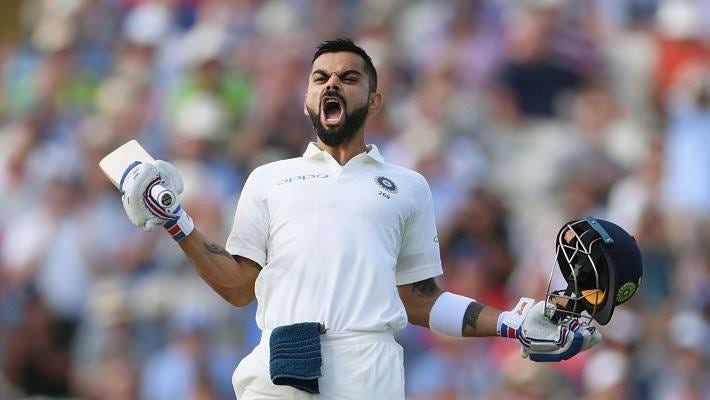Happy Birthday, Virat!
An ode to the man who never stops believin’
“Shot!”
Virat Kohli is omnipresent. When he plays cricket, it sometimes feels like a private performance, such is the frequency with which cameras and mics find him. In attack or defence, in aggression or resistance, he is forceful — leaving a ball is almost a power statement. He is a Muay Thai boxer playing The Gentleman’s Game.
So when, in his first test as captain, a young and inexperienced Indian team had to chase down 363 runs on a wearing fifth-day Adelaide pitch, he chose to go for the win. As batsman after batsman started crumbling to Nathan Lyon, Virat, from the other end, kept pushing new ones to chase the improbable target. Five down with an hour to go and seventy to win, he roared in appreciation when Wriddhiman Saha stepped out and deposited Lyon over mid-off for four.
Virat perished to Lyon’s extra turn too, but only after playing the innings that would define him as a batsman and captain. Conventional wisdom would’ve dictated Kohli and Saha — even Rohit, who came before him — to count their blessings and shut shop. India don’t enjoy a proud record in Australia, were directly coming off a drubbing in England, and a draw would’ve been a perfectly acceptable result to start off the series and a much-anticipated captaincy career. But draws aren’t for Virat. In the post-match press conference, you could feel the pride with which he spoke about his “boys”, even if it belied the heartache that leaving a generational innings incomplete would’ve caused him.
“I am a little bit hurt that we couldn’t cross the line, but that’s how the sport goes. At no point did we think of backing down. No regrets.”
New BCCI chief and former firebrand Sourav Ganguly recently called Virat the most important man in Indian cricket, and one could wager that the first steps were taken that afternoon in Adelaide. In the many interviews he has given since, Kohli has often spoken about the mental side of cricket, especially the power of belief. In sport, a lot of public discourse can be bluster and Virat is a proud man, but at no point does any of what he says sound out of sync with the cricketer we so often watch or the evangelist of the game he has become. Watching Virat Kohli speak or play cricket is a lesson in just that — the power of belief.
You would have to stretch your mind long back, maybe to a time a few months before that Adelaide test, when Virat Kohli last looked or felt uncertain. No discussion about Virat, until the summer of 2018, was complete without an England 2014-sized question mark. In a career where he has rarely seen a dip, a bad — dismal — record at the spiritual home of cricket was an albatross that was forced upon his neck. It would weigh down the best.
At Edgbaston, he walked out like it was Mohali. Tormentor-in-chief James Anderson beat his bat many, many times, but Kohli was unperturbed — those tentative jabs outside the off-stump had long been replaced by soft hands and a still head. What followed must rank as one of the most special test innings he will ever play, purely for the mental and technical resilience it must’ve taken to battle his demons.

What was even more staggering was the inevitability about that hundred. No one who had watched Virat Kohli closely over the last five years was under any doubt that he would score a hundred on his return to England. More importantly, Virat Kohli did not doubt that he would score a hundred on his return to England.
In that journey between the summer of 2014 to now, Virat has weaved a garland of incredible batting performances and brave victories as skipper, but an even greater contribution to Indian cricket, and to the country in general, has been his transformation as an athlete. India has never been younger, and the importance of watching one of the biggest icons in the country go from a chubby talent to a machine who can run a hundred out of 160 runs in an ODI inning cannot be overestimated.
Virat Kohli turns 31 today. He’s just a decade old in international cricket and yet, has already established a legacy that would be the envy of most. I made a vow to myself when I started this article — I wouldn’t talk about his numbers. He has normalised the absurd to such an extent that it feels like a disservice to explain him through averages, runs, or even his captaincy stats.
Virat Kohli’s greatest legacy is etched in two of his most heartbreaking defeats. At Adelaide in 2014, when he told the world that he will run after the seemingly impossible; and at Old Trafford in 2019, when everyone who wasn’t a Kiwi expected India to at least play the World Cup final, if not win the bloody thing, such was the strength of the team he had built and led over the years.
Happy Birthday, Virat. A good cover drive, especially if it’s coming from your bat, is indeed therapeutic.

